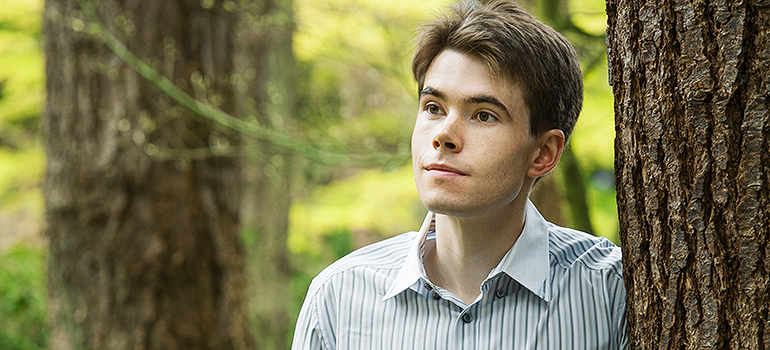
Will Guest is the youngest grad of UBC’s MD/PhD program. He’s also in line for his first patent
At an age when most of his peers are still finding themselves, Will Guest will add the letters M.D. and PhD to his signature—and soon a patent to his name.
This month, the 25-year-old will become the youngest graduate from UBC’s combined MD/PhD program, having started at 19 and completing it a year sooner than usual.
After skipping fifth grade and taking university math courses while still in high school, Guest graduated from the University of Manitoba with degrees in physics and biochemistry and had to decide in which direction he was headed.
“At the time, only University of Toronto and UBC offered MD/PhD programs, and I was more impressed with the quality and organization of the program here,” says Guest, who admitted that his younger brother’s well-timed admission to UBC’s undergraduate program in geophysics also nudged him towards the west coast campus.
Now, an algorithm Guest formulated with his mentors, neurologist Neil Cashman and physicist Steve Plotkin, is patent-pending and shows promise in aiding the development of diagnostic tests for neurodegenerative disorders such as amyotrophic lateral sclerosis (ALS, also known as Lou Gehrig’s disease) and Creutzfeldt-Jacob disease (the human variant of bovine spongiform encephalopathy, also known as mad cow disease).
“At present there are poor diagnostic tests and therapeutic options for both diseases,” says Guest. “Patients are diagnosed at late stages when they experience motor deficits or rapidly deteriorating dementia—and in some cases only after death.
“It’s hard to not let research become your life, but ultimately total immersion is often what it takes in order to make meaningful contributions.”
“By figuring out the molecular mechanism of these diseases, we could catch them early on, and also identify new potential targets for treatment.”
Guest’s algorithm searches for regions in a protein that become exposed when it misfolds, creating a sort of “handle” that an antibody can latch onto. It is currently being tested by Cashman’s spin-off company, Amorfix Life Sciences.
Described as “mathematically gifted and scientifically creative” by Cashman, a world-leader in prion disease research, Guest exudes a humble confidence that only comes from really knowing your stuff—and how much there is yet to learn.
While references have been made—usually by much-older colleagues—to Doogie Howser M.D., the ’90s TV series’ young medical savant, Guest admits he has never actually seen the show, or has time for TV for that matter.
“Research is quite all-consuming,” says Guest, who credits his U of M professor Ken Standing for his pursuit of a research career. “Dr. Standing was in his late seventies and had already retired by the time I worked with him, but his dedication and passion for research—he’s now in his mid-eighties and still active in the lab—is a real inspiration to me.
“It’s hard to not let research become your life, but ultimately total immersion is often what it takes in order to make meaningful contributions.”
